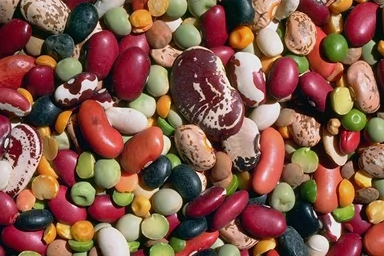In my practice, I meet many individuals whose diets are devoid of beans and lentils because they fear the social consequences should they expel gas in public. From a nutritional standpoint, this is particularly concerning when the client is a vegan because legumes offer the highest protein per serving of any plant-based food. However, even the currently popular paleolithic diet has many omnivores shunning legumes b ecause their starch content supposedly promotes fat storage. No matter what the reason, we can’t deny the fact that legumes are an excellent source of soluble fibre nor its role in maintaining bowel regularity.
ecause their starch content supposedly promotes fat storage. No matter what the reason, we can’t deny the fact that legumes are an excellent source of soluble fibre nor its role in maintaining bowel regularity.
Here are a few ways to prepare and obtain the benefits of legumes while limiting their gas-forming potential:
1.If you aren’t accustomed to eating legumes, start with the small ones. Red lentils, green lentils, adzuki beans, mung beans and black-eyed peas are best bets. Slowly work your way up to the larger beans that have tougher coats (kidney beans, lima beans).
2. If you are cooking beans from dry, discard the soaking water and replace with fresh water before cooking. Then, rinse them again after they are cooked.
 3. Before eating them, rinse, rinse and rinse canned beans in a colander/sieve until no foam remains. This foam is created by the gas escaping from the beans! Let them sit in your colander for a few minutes. If you listen to them carefully, you will hear the gas escaping.
3. Before eating them, rinse, rinse and rinse canned beans in a colander/sieve until no foam remains. This foam is created by the gas escaping from the beans! Let them sit in your colander for a few minutes. If you listen to them carefully, you will hear the gas escaping.
4. Puree cooked legumes to make hummus, soups or lentil dahl. This will release more gas prior to ingestion.
5. Avoid the type of processed bean meal that can’t be rinsed, like those canned ‘pork and beans in tomato sauce’ I used to eat as a child.
6. Easy does it! Start by using legumes as toppings for a meal rather than sitting down to a big bowl of baked beans. It takes time to foster the intestinal flora that can break down the complex starches in beans. This is critical because the human digestive organs do not manufacture the enzymes that digest some of the carbohydrates found in legumes.
If you find you are still gassy after following the above tips, it may have to do with your current gut ecology–that is, the type of micro-organisms that reside inside of your intestinal tract. Stinky gas is never a sign of health, so if it smells like a stink bomb, your dietary habits may require the attention of a nutritionist.
